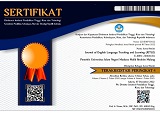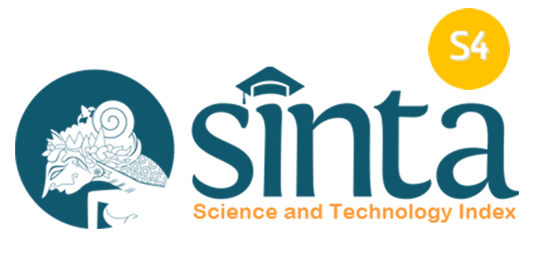The significance of Podcasting for EFL learning
Abstract
Keywords
Full Text:
PDFReferences
Abdous, M., Camarena, M. M. and Facer, B. R. (2009). MALL technology: Use of academic podcasting in the foreign language classroom. ReCALL 21(1): 76–95.
Alfa, R. R. (2020). Using Podcast as authentic materials to develop studentsâ€tm speaking skill. JELLT (Journal of English Language and Language Teaching), 4(1), 65–74. https://doi.org/10.36597/jellt.v4i1.7692
Alqahtani, M. (2015). The importance of vocabulary in language learning and how to be taught. International Journal of Teaching and Education, III(3), 21–34. https://doi.org/10.20472/te.2015.3.3.002
Baehaqi, L. (2014). Improving the Listening Skills through “The Discovery Listening.The Multifaceted Dimensions of English Linguistics, Literature, and Education, 129-138.
Bagus, I., Mantra, N., Handayani, N. D., Suwandi, N., & Maba, W. (2022). Promoting students’ academic speaking skills through project report presentation. International Journal of Linguistics and Discourse Analytics, 3(2), 94–100.
Berry, R. (2006). Will the iPod kill the radio star? Profiling podcasting as radio. Convergence 12(2): 143–162.
Bustari, A., Samad, I. A., & Achmad, D. (2017). The use of podcasts in improving students’ speaking skill. JELE (Journal of English Language and Education), 3(2), 97. https://doi.org/10.26486/jele.v3i2.256
Cebeci, Z. and Tekdal, M. (2006). Using podcasts as audio learning objects. Interdisciplinary Journal of ELearning and Learning Objects 2(1): 47–57.
Chung, M.-Y. and Kim, H.-S. (2015). College students’ motivations for using podcasts. Journal of Media Literacy Education 7(3): 13–28
Clark, C., & Rumbold, K. (2006). Reading for pleasure: A research overview. National Literacy Trust, November, 35.
Fachriza, A. (2023). Promoting EASPod application for academic speaking for EFL in pesantren—based university. 4(1), 215–221.
Farangi, M. R., Nejadghanbar, H., Askary, F. and Ghorbani, A. (2015). The effects of podcasting on EFL upperintermediate learners’ speaking skills. Computer Assisted Language Learning Electronic Journal 16(2):
1–18
Fardavoodi, M., Gojar, S. I., & Bakhtiarvand, M. (2020). Investigating the effect of using educational podcasts on listening comprehension of language learners. Randwick International of Education and Linguistics Science Journal, 1(1), 101–106. https://doi.org/10.47175/rielsj.v1i1.35
Fatika, N. F., & Rahayu, E. M. (2021). Using podcast media on teaching listening in new normal era. Academic Journal Perspective : Education, Language, and Literature, 9(1), 68. https://doi.org/10.33603/perspective.v9i1.5031
Getie, A. S. (2020). Factors affecting the attitudes of students towards learning English as a foreign
language. Cogent Education 7(1): 1738184.
Grant, P. and Basye, D. (2014). Personalized learning: A guide for engaging students with technology.
Washington, DC: International Society for Technology in Education
Hasan, M. and Hoon, T. B. (2012). ESL learners’ perception and attitudes towards the use of podcast in developing listening skills. The English Teacher 41(2): 160–173
Hughes, R. (2005). Spoken English, TESOL and applied linguistics: Challenges for theory and practice. Spoken English, TESOL and Applied Linguistics: Challenges for Theory and Practice, January 2006, 1–289. https://doi.org/10.1057/9780230584587
Ibrahim, A. (2022). The Positive impact of using podcasts in education in El Baha University College of Science and Arts Elmikhwa Branch. International Journal of Educational Research Review, 7(4), 324–328. https://doi.org/10.24331/ijere.1174579
Indahsari, D. (2020). Using podcast for EFL students in language learning. JEES (Journal of English Educators Society), 5(2), 103–108. https://doi.org/10.21070/jees.v5i2.767
Istanto, J. W. and Indrianti. (2011). Pelangi Bahasa Indonesia podcast: What, why and how?. Electronic Journal of Foreign Language Teaching 8(1): 371–384
Koehler, M. J. and Mishra, P. (2009). What is technological pedagogical content knowledge? Contemporary Issues in Technology and Teacher Education 9(1): 60–70.
Lord, G. (2008). Podcasting communities and second language pronunciation. Foreign Language Annals 41(2): 364–379
O’Brien, A., & Hegelheimer, V. (2007). Integrating CALL into the classroom: The role of podcasting in an ESL listening strategies course. ReCALL, 19, 162–180. https://doi.org/10.1017/S0958344007000523
Mirza Suzani, S. (2021). Investigating the effect of podcasting on Iranian senior undergraduate TEFL students’ listening comprehension improvement and motivation. The Asia-Pacific Education Researcher, 30(5), 395–408. https://doi.org/10.1007/s40299-020-00526-w
Moore, T. (2022). Pedagogy, podcasts, and politics: What role does podcasting have in planning education?. Journal of Planning Education and Research, February. https://doi.org/10.1177/0739456X221106327
Ningrum, N. K., & Listyani, L. (2022). Academic speaking students’ efforts in minimizing their lack of self-confidence. Prominent, 5(2), 141–167. https://doi.org/10.24176/pro.v5i2.7874
Panagiotidis, P. (2021). Podcasts in language learning: Research review and future perspectives. EDULEARN21 Proceedings, 1(July), 10708–10717. https://doi.org/10.21125/edulearn.2021.2227
Ramli. (2018). The Use of Podcast to improve students’ listening and speaking skillsfor EFL learners. Advances in Social Science, Education and Humanities Research, 145(Iconelt 2017), 189–194.
Rao, P. S. (2019). The importance of speaking skills in English classrooms. Alford Council of International English & Literature Journal, 2(2), 6–18.
Rochma, A. F. (2023). Corrective oral feedback on students’ errors in speaking courses. Journal of English Language Teaching and Learning (JETLE), 4(2), 125-135.
Rosell-Aguilar, F. (2015). Podcasting as a language teaching and learning tool. 10 Years of the LLAS Elearning Symposium: Case Studies in Good Practice, September, 31–39. https://doi.org/10.14705/rpnet.2015.000265
Samad, I. A., Bustari, A. and Ahmad, D. (2017). The use of podcasts in improving students’ speaking skill. Journal of English Language and Education 3(2): 97–111
Saragih, D., Marpaung, A., & Saragih, R. P. S. (2022). Influence of Podcast in improving students’ listening skill of senior high school. International Journal Corner of Educational Research, 1(2), 57–68. https://doi.org/10.54012/ijcer.v1i2.81
Sheylani, H., & Pourhosein, A. (2021). Investigating the effect of Podcasting on Iranian Intermediate EFL Learners ’ Listening Comprehension Skill. 0672(December).
Shiri, S. (2015). The application of podcasting as a motivational strategy to Iranian EFL learners of English: A view toward listening comprehension. Advances in Language and Literary Studies 6(3): 155–165.
Stanley, G. (2006). Podcasting: Audio on the Internet comes of age. Teaching English as a Second or Foreign Language: The Electronic Journal for English as a Second Language 9(4): 1–7
Student, M. T., Kumar, R. R., Omments, R. E. C., Prajapati, A., Blockchain, T.-A., Ml, A. I., Randive, P. S. N., Chaudhari, S., Barde, S., Devices, E., Mittal, S., Schmidt, M. W. M., Id, S. N. A., PREISER, W. F. E., OSTROFF, E., Choudhary, R., Bit-cell, M., In, S. S., Fullfillment, P., … Fellowship, W. (2021). No 主観的健康感を中心とした在宅高齢者における 健康関連指標に関する共分散構造分析Title. Frontiers in Neuroscience, 14(1), 1–13.
Suvarnaphaet, K. M., & Suvarnaphaet, P. (2023). Use of Podcasts to develop students’ speaking skills. HASS: Humanities, Arts and Social Sciences Studies , 23(1), 1–8.
Syahabuddin, K., & Rizqa, K. (2021). Improving students’ listening skill using Podcasts. Journal of Digital Education, Communication, and Arts (Deca), 4(01), 51–61. https://doi.org/10.30871/deca.v4i01.2867
Sayadi, M. and Mashhadi Heidar, D. D. (2018). The impact of using podcasts on Iranian autonomous /nonautonomous EFL learners’ listening comprehension ability at pre-intermediate level. Internasional Journal of Research in English Education 3(3): 72–82
Tantri, Y. G., Romadlon, F. N., & Nurcahyo, A. D. (2023). The Problems encountered by non-English department students in speaking English. International Journal of Research in Education, 3(1), 1–11. https://doi.org/10.26877/ijre.v3i1.12628
Tarigan, R., & Listyani, L. (2021). Poster presentation as a tool to assess students’ academic speaking performance: Teachers and students’ perspectives. Lensa: Kajian Kebahasaan, Kesusastraan, Dan Budaya, 11(1), 1. https://doi.org/10.26714/lensa.11.1.2021.1-16
Top, T., Stanley, G., British, T., Barcelona, C., & Richardson, W. (2006). Podcasting: Audio on the internet comes of age. Notes, 9(4), 1–7.
Wati, W. S., Dj, M. Z., & Hasanah, U. (2023). Thinking in English as a strategy in creating better performance for the students’ critical speaking skill. Journal of English Language Teaching and Learning (JETLE), 4(2), Article 2. https://doi.org/10.18860/jetle.v4i2.20416
Winnie, W., Leong, H. J., Badiozaman, I. F., & Yap, A. (2023). Negotiating the challenges in speaking English for Indonesian undergraduate students in an ESL university. Studies in English Language and Education, 10(2), 822–840. https://doi.org/10.24815/siele.v10i2.26563
Yiemkuntitavorn, S. (2021). Development of Podcasts to enhance foundation English proficiency of undergraduates at Sukhothai Thammathirat Open University. 13(1), 31–41.
Yoestara, M., & Putri, Z. (2019). Podcast: An alternative way to improve EFL students’ listening and speaking performance. Englisia Journal, 6(1), 15. https://doi.org/10.22373/ej.v6i1.3805
Yudhiantara, R., & Nasir, I. A. (2017). Toward Mobile-Assisted Language Learning (MALL): Reaping mobile phone benefits in classroom activities. Register Journal, 10(1), 12. https://doi.org/10.18326/rgt.v10i1.813
DOI: https://doi.org/10.18860/jetle.v5i1.23582
Refbacks
- There are currently no refbacks.
Jalan Gajayana 50 Malang 65144, Jawa Timur, Indonesia

This work is licensed under a Creative Commons Attribution-ShareAlike 4.0 International License.
Indexed by






